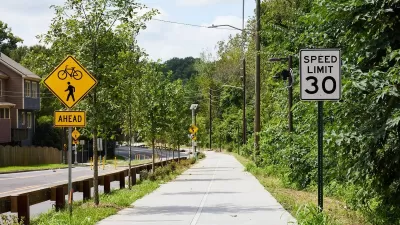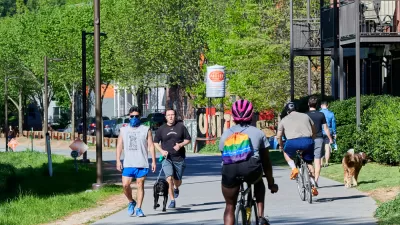Atlanta's Beltline project is one of the most ambitious transportation plans the city has seen in decades, but the downturn in the economy could wreak havoc on its progress.
The ring of parks and open space linked with a city rail system was given a timeline of 25 years back when it was approved by the Atlanta City Council in 2005. But then 2008 came along.
"Many would agree that Atlanta, being one of the worst cities in the country in terms of its existing transportation methods, in my opinion, needs change. The unfortunate part of the plan is the number of things that can go wrong in the next 20 years, some of which have already begun.
When the project was underway four years ago, its views on future economic conditions were optimistic. However, things do not always happen as planned. For example, a recession hitting in 2007 was not foreseen. The proposed cost for the BeltLine was set at $2.8 billion, most of which was expected to come from the BeltLine Tax Allocation District (TAD), with the rest from donations. Generally, recessions are not a good time for donating much, if at all, to projects such as the BeltLine."
FULL STORY: Can Atlanta's BeltLine project still become a reality?

Maui's Vacation Rental Debate Turns Ugly
Verbal attacks, misinformation campaigns and fistfights plague a high-stakes debate to convert thousands of vacation rentals into long-term housing.

Planetizen Federal Action Tracker
A weekly monitor of how Trump’s orders and actions are impacting planners and planning in America.

In Urban Planning, AI Prompting Could be the New Design Thinking
Creativity has long been key to great urban design. What if we see AI as our new creative partner?

Portland Raises Parking Fees to Pay for Street Maintenance
The city is struggling to bridge a massive budget gap at the Bureau of Transportation, which largely depleted its reserves during the Civd-19 pandemic.

Spokane Mayor Introduces Housing Reforms Package
Mayor Lisa Brown’s proposals include deferring or waiving some development fees to encourage more affordable housing development.

Houston Mayor Kills Another Bike Lane
The mayor rejected a proposed bike lane in the Montrose district in keeping with his pledge to maintain car lanes.
Urban Design for Planners 1: Software Tools
This six-course series explores essential urban design concepts using open source software and equips planners with the tools they need to participate fully in the urban design process.
Planning for Universal Design
Learn the tools for implementing Universal Design in planning regulations.
Gallatin County Department of Planning & Community Development
Heyer Gruel & Associates PA
JM Goldson LLC
City of Camden Redevelopment Agency
City of Astoria
Transportation Research & Education Center (TREC) at Portland State University
Jefferson Parish Government
Camden Redevelopment Agency
City of Claremont




























